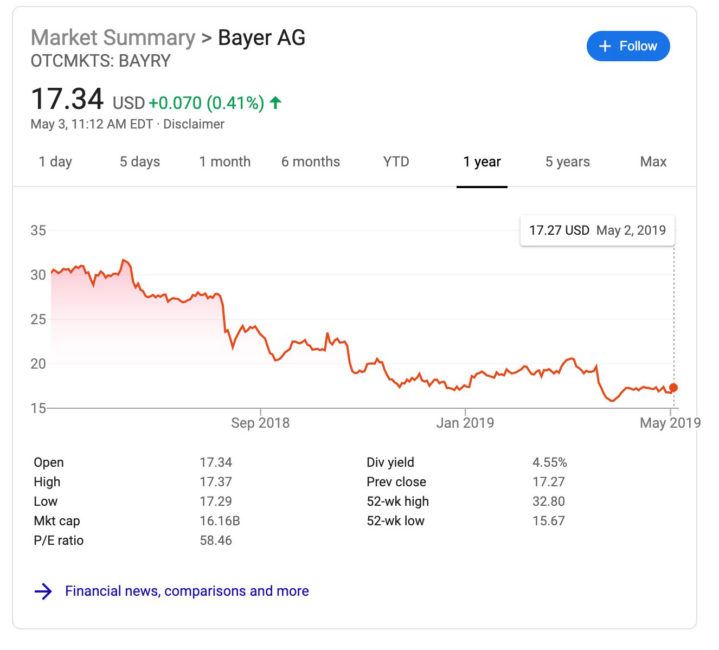EPA Says Roundup Is Safe While Bayer Is Losing Millions In Lawsuits
Bayer finally got some good news after two recent major defeats in court. With more than 11,000 lawsuits pending, Bayer stands to lose billions, but at least the EPA is in its corner.
The lawsuits claim that glyphosate causes cancer. In March a federal jury in San Francisco awarded $80 million to Edwin Hardeman, a plaintiff with cancer. In August of last year, Bayer was ordered to pay 289 million to Dewayne Johnson, though the award got cut down to 78.5 million. Regardless, the EPA…
…continues to find that there are no risks to public health when glyphosate is used in accordance with its current label and that glyphosate is not a carcinogen.”
Environmental advocates denounced the decision, and so did the U.S. Department of Health and Human Service’s Agency.
Just weeks ago, the administration’s own officials at the U.S. Department of Health and Human Service’s Agency for Toxic Substances and Disease Registry released a toxicology report for glyphosate, which confirms that exposure to the toxic herbicide is harmful to human health. ‘Health agencies and credible non-industry experts who’ve reviewed this question have all found a link between glyphosate and cancer,’ Sass says.”.
Recommended: How To Heal Your Gut
Right now Bayer is in the middle of the third glyphosate lawsuit. It’s a joint trial with Alva and Alberta Pilliod. Brent Wisner is representing the married couple from Livermore, California. They say that their 35 years of spraying Roundup on their residential properties gave them the disease.
The probability that both Alva and Alberta would get non-Hodgkin lymphoma is 1 in 20,000, Wisner told the 12-person jury in Oakland on Thursday. Their treating physician said it was so unlikely they would both develop the same cancer that an environmental factor like Roundup was the likely culprit.”
Alva was diagnosed with non-Hodgkin lymphoma in 2011. He has been in remission ever since, but he says the aggressive chemotherapy degraded his cognitive abilities. Alberta was diagnosed with the same cancer in 2015. She had a tumor in the middle of her brain. The chemotherapy left her with extensive brain damage and then she relapsed. She did more chemotherapy and is now said to be in remission.
In the lawsuit, Brent Wisner has made the explosive allegation that Monsanto used fake data to win over regulators.
The company planted one of its employees at a contract lab called Industrial Bio-Test Laboratories (IBT) in the 1970s to fake negative mouse carcinogenicity data for Roundup’s active ingredient glyphosate that were to be used to win regulatory approval for the weed killer in 1975; planned an attack to discredit the World Health Organization’s (WHO) cancer research agency, anticipating the agency would classify glyphosate as a probable human carcinogen in 2015; and exploited “deep connections” within the U.S. Environmental Protection Agency to classify glyphosate as non-carcinogenic.
Related: Gluten Intolerance, Wheat Allergies, and Celiac Disease – It’s More Complicated Than You Think
Glyphosate may increase the risk of non-Hodgkin lymphoma by 41%, but it’s not just cancer we have to worry about. A recent study showed that individuals who were exposed to pesticides were more than twice as likely to have heart problems including heart disease. Another recent study showed that prenatal exposure to glyphosate increased odds of having a child with autism spectrum disorder with intellectual disabilities by 30%. It also has been shown to cause tumors and birth defects.
And glyphosate is hard to avoid. Corn is often drenched in glyphosate, so are oats and wheat and many other very common crops. It’s been found in beer, wine, and coffee. In another study, it was found in 93% of urine tested.
Related: Foods Most Likely to Contain Glyphosate
Bayer bought Monsanto for 66 billion dollars in 2016. Since then Bayer’s share prices have been cut in half.

Bayer firmly believes that the science supports the safety of glyphosate-based herbicides, which are some of the most thoroughly studied products of their kind, and is pleased that the regulators tasked with assessing this extensive body of science continue to reach favorable conclusions.”
